- Home
- James A. Michener
The Bridge at Andau Page 2
The Bridge at Andau Read online
Page 2
As one of the most important factors in the control of Hungary, Radio Budapest was constantly guarded by eighty crack AVO men with machine guns, which the citizens of the area jokingly referred to as “Russian guitars.” The nest of buildings was almost impossible to penetrate without endless written permissions and security checks. It was guarded not only by the fanatical AVO men, but also by two thick wooden doors fortified by oaken beams and studdings. The communist leaders of Hungary had long ago determined that no unruly crowd would ever storm Radio Budapest.
Nevertheless, toward dusk on October 23, young people, uneasy because of rumors that were flying about the city to the effect that an uprising of some kind had been launched by college students, began haphazardly to gather in the street in front of Radio Budapest. They saw the eighty AVO men inside dispose themselves at vantage points and open the massive doors for the entrance of large numbers of AVO reinforcements carrying fresh supplies of ammunition. The building would now be twice as difficult to capture.
At nine o’clock that night, while the crowd still hovered near the station, a group of university students arrived at the great wooden doors and demanded the right to broadcast to the people of Hungary their demand for certain changes in government policy. These young men sought a more liberal pattern of life. The AVO men laughed at them, then condescendingly proposed, “We can’t let you broadcast, but we’ll tell you what we’ll do. We’ll let you put your complaints on tape, and maybe later on we’ll run the tapes over the air.” The students refused to fall for this trick and tried to force their way into the building, but the AVO men swung the big doors shut.
The crowd, observing this defeat, became more menacing and, joining the students, tried to push the doors down. The AVO were well prepared for such a threat and promptly tossed scores of tear-gas bombs into the crowd, which chokingly retreated into the museum park, where there was fresher air.
But that night the mood for freedom was so great in Budapest that soon the entire crowd was again pressing at the doors, and was again driven off by tear gas. This time a new AVO weapon was brought into play, for from the corners of the roof two immense beacon lights were suddenly flashed on, so that the AVO men inside the building and their spies in the crowd could start identifying and listing the troublemakers.
A loud cry of protest rose from the crowd, and stones began to fly toward the offending beacons. This the AVO men could not tolerate. They began firing into the crowd.
“They are killing us!” women screamed.
“They are crazy dogs!” students shouted from the front ranks. “Fight them.”
The unhurried AVO men, secure inside thick walls, continued firing into the crowd and many people fell, whereupon an officer in the Hungarian army made a difficult decision. He had sworn to protect Hungary—and this meant particularly the communist government—from all enemies, but these enemies attacking Radio Budapest were neither foreigners nor the capitalist dogs he had been warned against. They were his brothers and his children and the women he loved. In despair he watched such people being shot down, and then he made his choice.
Leaping onto a truck, he shouted to the murderers, “You swine! What people are you killing? Are you crazy!”
A fearful hush came over the crowd as they listened to this military man risk his life in the bright light of the beacons. “You swine!” he shouted. “Stop this shooting!”
From somewhere in the darkened building a machine gun rattled, and the army officer fell dead. He was the first soldier of communist Hungary to die fighting for freedom.
A sullen roar rose from the crowd, and those nearest the radio station began to beat senselessly on the door and on the stones of the building. Wiser leaders saw that the crowd—they were not yet revolutionists—had no hope of assaulting the station unless arms of some kind arrived.
At this moment a decisive event in the battle for Budapest—and in modern world history—took place. It was one that college students and intellectuals in their craziest dreams could not have anticipated, for up from the southern part of the city a line of trucks began to appear, and from them climbed down workmen, just average workmen in working clothes.
An observer from some country outside of Hungary would not have comprehended the astounded thrill that swept the crowd that night when these workmen appeared, for they were men from Csepel, and with their arrival the lies of communism were unmasked.
“Here come the men from Csepel!” a woman shouted.
“They’re bringing arms and ammunition!” cried a student.
“Look at them!”
And they were, indeed, a miracle, for they had come from nearby Csepel Island, the very heartland of the communism they were now determined to fight against. They came from the factories the communists had organized first, from the workshops where there had not been a capitalist for eleven years, from the center and the soul of communism. Once these men had been known simply as “The Reds of Csepel.” Now they climbed stolidly down from their trucks and began erecting machine-gun emplacements. Without these determined men from Csepel nothing substantial could have been accomplished; with them even freedom was within reach.
Their first act epitomized their tremendous role in the revolution. They set up a heavy gun on the back of a truck, trained it on the roof, and calmly shot out the eastern beacon. With that symbolic shot the harsh glare of communism began to go out all over Budapest.
It was while the determined freedom fighters from Csepel were bringing their guns to bear upon the western beacon that young Josef Toth joined the crowd at the radio station, and if the workmen in his factory had been afraid of mentioning the word AVO, here things were much different.
“We will destroy the AVO,” an excited demonstrator harangued the crowd.
The stolid men of Csepel studied their gun, fired it, and brought down the second beacon.
“Curse the AVO,” shouted the crowd.
Now new proof of the terror under which Budapest had been living in communist days was provided, for from nearby Rakoczi Street an ordinary ambulance, white and with a red cross, moved slowly toward Radio Budapest. It was temporarily stopped by some students who cried, “We are glad to see you have come for the wounded.” And the crowd made a path for the ambulance.
But it drove right past the rows of wounded who had been pulled aside for just such medical aid.
“Where are you going?” the students shouted. “Here are the wounded.”
The lone driver replied, with some hesitation, “My orders are to pick up the wounded inside the building.”
“No! No!” the people in the street cried, and Josef Toth joined the protest.
“I must go there,” the driver pleaded. “Orders.”
He tried to force his ambulance through the crowd, but in doing so ran over the foot of one of the fighters, who shouted in pain. This caused Toth and a group of watchers to rip open the ambulance door and drag the driver into the street. But as they did so they uncovered a cargo, not of medicine and bandages, but of guns and ammunition for the AVO.
“My God!” a woman screamed.
“Look at the grenades!” Toth shouted to the people surging up behind him.
There was a moment of horrified silence, then a hoarse whisper, “We have an AVO man.”
Later that night Toth tried to explain what had happened. “A thousand hands grabbed for him. They began to tear this way and that. I heard him pleading that he was not an AVO man, but new hands grabbed at him.”
Young Josef, at eighteen, had witnessed a terrible sight. “Finally,” he explained quietly, “someone took a gun from the ambulance and shot him. It was better.”
When the body of the AVO man had been kicked aside, young men unloaded the ambulance and passed the cache of arms out to the workers from Csepel, who, with the weapons they already had, said, “We think we can storm the building.”
From the upper windows fresh volleys of AVO machine-gun fire warned the Csepel men that the job would not
be easy. One Csepel man, assuming leadership, said simply, “All you without guns, go back.” As the crowd retreated, he said, “Some of you men stay and build barricades, here and here.” The real fight for the radio station was about to begin.
At this point a boy of sixteen, brandishing a rifle, nudged Josef Toth and gave him some startling news. “I think there used to be a tunnel into that building,” the boy whispered.
“No,” Toth replied. “The AVO wouldn’t allow that.”
“I was told by my father it was built when the Germans were here,” the boy insisted. “All these buildings were connected by tunnels.”
The boy stayed close to Toth, as if Josef were somehow an older man and therefore to be trusted, and together they sought out one of the Csepel men. He was twenty and his face showed the stubble of a black beard, so he seemed quite mature. “This boy says there used to be a tunnel into the radio building,” Toth said, with enough disbelief in his voice to save himself embarrassment in case the Csepel man laughed.
“Let’s go see,” the Csepel man said, and he called three of his companions.
The six explorers, each armed, left the fighters in the street, climbed over a half-finished barricade, and entered a house well down toward Jozsef Boulevard. “Is there a tunnel in your cellar?” the Csepel man asked.
“Yes,” the owner of the house said. “We built it in Hitler times.”
“Where does it lead?”
“I don’t know.”
He led the five fighters into the cellar and pushed aside a door that had been leaned against a dark opening. “Have you a flash?” the leader asked.
The light showed that the cellar floor dropped off into a deep tunnel. The Csepel man led his companions into the tunnel and cautiously along tortuous and damp passages until he stopped and said softly, “This may lead to the radio building. You two boys go back and get two dozen men with machine guns.”
Without a light, feeling the wall with their hands, Josef Toth and his new friend picked their way back to the house, where the owner waited apprehensively in the cellar. Inspired by a wisdom beyond his eighteen years, Toth said to the boy, “You stay here and see he doesn’t move. We don’t know who he is.”
When he returned from the street with a score of tough Csepel men, he found the boy leaning against the wall, his gun pointed at the frightened owner of the house.
“You stay here,” Toth commanded.
“What are you going to do?” the boy asked, as the Csepel men went down into the tunnel.
“There may be some fighting,” Toth said. “You keep watch.”
He jumped into the tunnel and followed the silent forms ahead of him. Soon his recruits reached the first four Csepel men, and the leader said, “We’ve been listening. I think there’s AVO men in there.”
The crowd fell silent and from some area beyond a flimsy door they heard voices. Possibly a group of wounded AVO had taken refuge in the cellar. The Csepel man said bluntly, “We’ll go in and see.”
He picked four resolute young men—they were communists from the Rakosi Metal Works—and said, “I’ll rush the door. They’ll be taken by surprise, and you be ready to shoot over me. I’ll probably fall down.”
“Why not shoot as we go in?”
“They may be prisoners thrown down here by the AVO.”
“I think we’ll shoot anyway,” one of the four said.
The Csepel man thought a minute and said, “All right. But at first shoot a little high. That’ll scare them and you can see who they are.”
“We’ll come in shooting,” the other Csepel men replied, but they made no promises about shooting high.
Then it happened. With a rush the first Csepel man burst in the door and found fifty AVO men. The Csepel men who followed didn’t shoot high. They fired with terrible vengeance and there was no battle.
The leader, who fell into the room on the door which had been masked from the inside, allowed the shooting to go on until the remaining AVO men surrendered. Then he rounded them up and said to Toth and six of his helpers, “Take these bastards out, but don’t kill them.”
“What are you going to do?” one of the appointed guards asked.
“I don’t know, yet,” the Csepel man said, and Toth last saw him seated on a box, looking up toward the doors which separated him from the radio studios above.
Toth and his six fellow guards led the AVO men, some crying from bad wounds, back into the first cellar, where the sixteen-year-old still leaned against the wall, his rifle cocked at the owner’s heart.
“We found fifty AVO men!” Toth shouted.
“They look like anybody else,” the boy said.
Toth looked at them and found he was trembling furiously. This was the first time he had ever faced an AVO man, and here he was in a cellar with more than thirty of them. But they didn’t look so dangerous now that six Csepel men threatened to blow them to pieces if they budged.
But when Josef Toth led the way back to the street where the fighting was going on, a different kind of AVO man—one still at large and with a machine gun on the roof of the radio building—fired a random blast and one of the bullets penetrated Toth’s left leg.
It was very painful and shattering, and blood spurted out of Toth’s pants. He fell to the street and the last thing he saw was some of the AVO men trying to run away in the confusion, but one of the Csepel men burped his machine gun and the AVO men pitched into the street. From the opposite direction there was a loud roar as grenades struck the heavy wooden doors leading into the radio building.
“The doors are going down!” a voice from far away shouted, and young Josef Toth fell senseless in Brody Sandor Street.
2
The Intellectuals
One aspect of the Hungarian revolution which must have caused much consternation in Soviet Russia was the fact that it was the young men whom communism had favored most who most savagely turned against it. The communist elite led the revolution against communism.
In spite of its propaganda that only communism can build a classless society, the system is actually built upon a horde of subtle class distinctions. Certain members of the party get all the rewards of society—the good apartments, the good radios, the good food, the best clothing—and it is by these constant bribes that communism builds an inner core of trusted leaders. The rest of the people can starve, for they are not of the elite, and since they lack power, they can do nothing to harm the movement.
I should like to report how two young communists, chosen by their party for top honors, reacted when faced by a choice between communism and patriotism. In the histories of these two men, the leaders of Russia will find just cause for nightmares; and young intellectuals from free countries, who sometimes think that communism might be fun as an alternative to what they already know, can see how they would probably react if a red dictatorship actually did engulf them.
Istvan Balogh got to the top because he loved books. He was the son of a laborer and therefore eligible for education beyond the high-school level, and it was a memorable day for his family when a high party official said, “We’ve been watching Istvan. He’s got a good head. We need young men who like books. How old is he?”
“Sixteen,” Istvan replied.
“To earn the right to a university education,” the old communist explained, “you must have work experience. I know a factory …”
“Am I old enough for a factory?” Istvan asked.
“You do seem frail,” the older man said, “but without factory experience nothing is possible.”
Istvan Balogh was accordingly given a job working a drill press in the Contakta electrical factory in Budapest. Although he was less strong than some of the men around him, he applied himself with extraordinary energy and month after month exceeded his quota. He became a favorite of the communist bosses and was soon appointed leader of the study group which after working hours was picking its way through Karl Marx, Lenin and Stalin.
Possibly because he
began spending so much time on his books, his production fell below the quota set for him by the communist leaders, and he was hauled off by the AVO, who held him for two days to check his loyalty to the factory and the regime. Satisfied, the AVO men released him and certified him as worthy of a university education.
But in order to test him thoroughly, they kept him in the factory for five years, and never again did he allow either his production to slip or his enthusiasm for communist doctrine to flag.
At twenty-two Balogh was a thin, wiry young man with jet-black hair that he wore rather long about the ears, fanatical black eyes, and a great capacity for work. He was a highly praised official member of the communist party and was accordingly judged fit to enter law school at the University of Budapest, in Pest, the eastern half of the city. Because he had been elected by the communist party, he was given special consideration and his professors were informed that he was headed for an important post in the government.
University life was a thrilling experience for Istvan. He not only had all the books he wanted for study, but he came to know a group of excellent professors. “They taught me law, Marxism, the history of communism and military science. They were profound men.”
More important, he found within the student body many alert young men whose ideas of the world were more advanced than his. He excelled them in his understanding of communism, however, and this helped him to maintain good marks, for the communist professors were highly skilled in Marxism and demanded an equal knowledge from every student who wished to become a lawyer.
Studious Istvan could not yet read Russian fluently, but when his professors warned him that he would not get a degree until he learned to do so, he applied himself to this difficult language, and because it was one of the most important subjects in his study, quickly went to the head of the class. He was on his way to becoming a leading communist lawyer when he got mixed up in a group of meetings which changed his whole life.

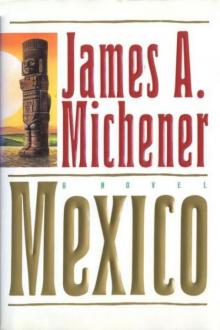 Mexico
Mexico The World Is My Home: A Memoir
The World Is My Home: A Memoir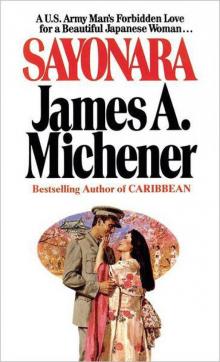 Sayonara
Sayonara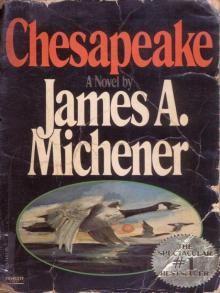 Chesapeake
Chesapeake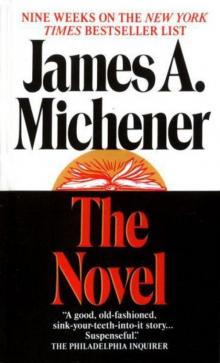 The Novel
The Novel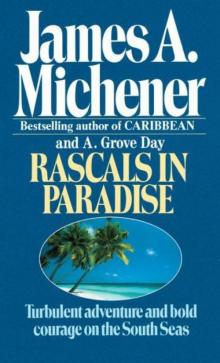 Rascals in Paradise
Rascals in Paradise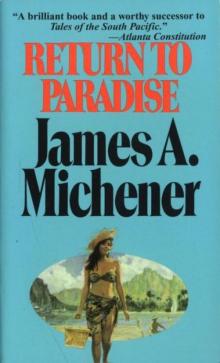 Return to Paradise
Return to Paradise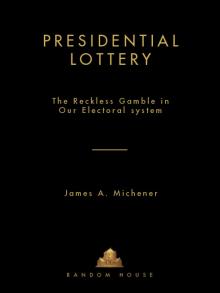 Presidential Lottery: The Reckless Gamble in Our Electoral System
Presidential Lottery: The Reckless Gamble in Our Electoral System The Source
The Source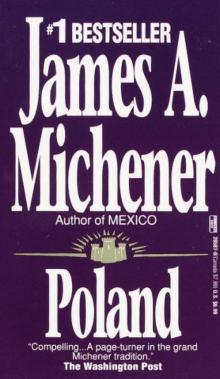 Poland
Poland Space
Space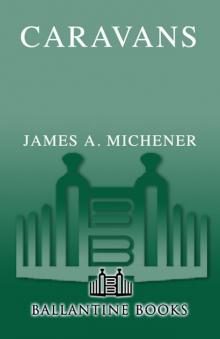 Caravans
Caravans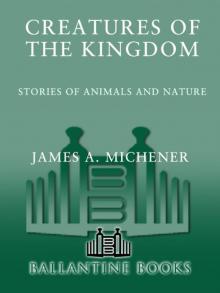 Creatures of the Kingdom: Stories of Animals and Nature
Creatures of the Kingdom: Stories of Animals and Nature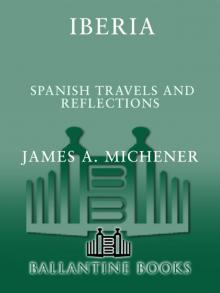 Iberia
Iberia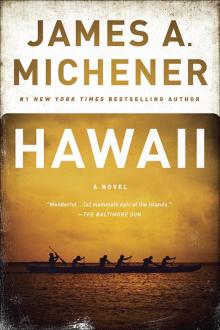 Hawaii
Hawaii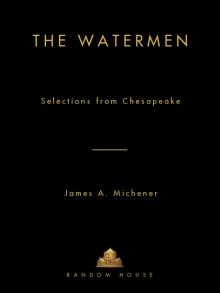 The Watermen: Selections From Chesapeake
The Watermen: Selections From Chesapeake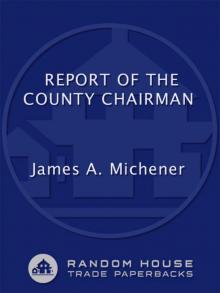 Report of the County Chairman
Report of the County Chairman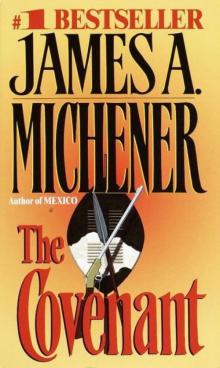 The Covenant
The Covenant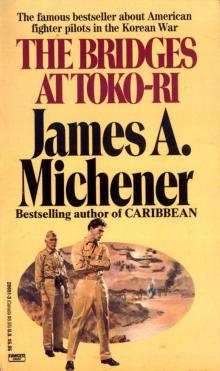 The Bridges at Toko-ri
The Bridges at Toko-ri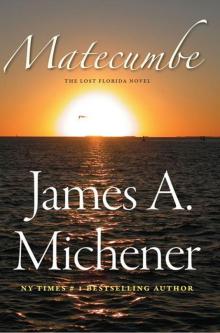 Matecumbe
Matecumbe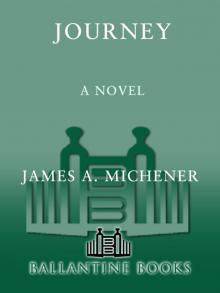 Journey: A Novel
Journey: A Novel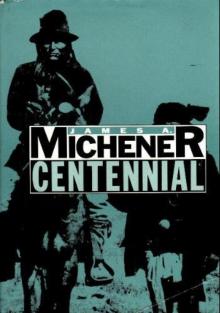 Centennial
Centennial Sports in America
Sports in America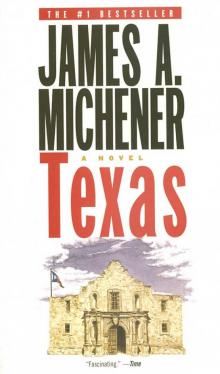 Texas
Texas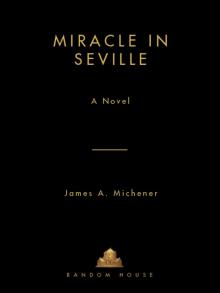 Miracle in Seville
Miracle in Seville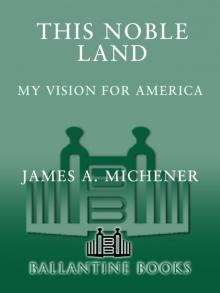 This Noble Land: My Vision for America
This Noble Land: My Vision for America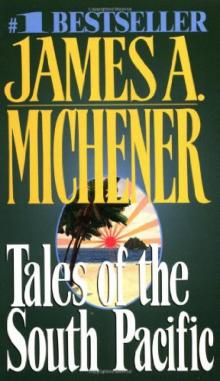 Tales of the South Pacific
Tales of the South Pacific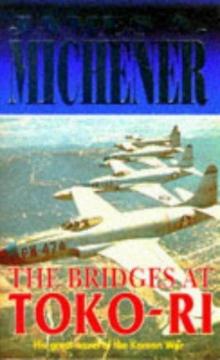 Bridges at Toko-Ri
Bridges at Toko-Ri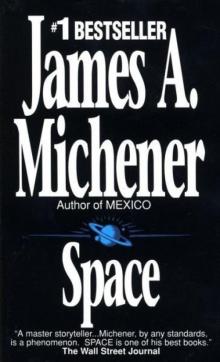 Space: A Novel
Space: A Novel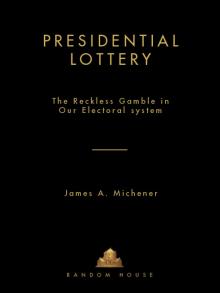 Presidential Lottery
Presidential Lottery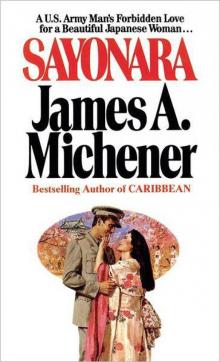 Sayonara: A Novel
Sayonara: A Novel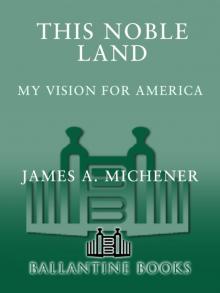 This Noble Land
This Noble Land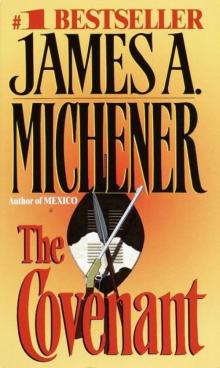 The Covenant: A Novel
The Covenant: A Novel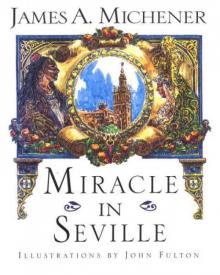 Miracle in Seville: A Novel
Miracle in Seville: A Novel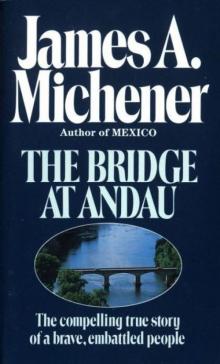 The Bridge at Andau
The Bridge at Andau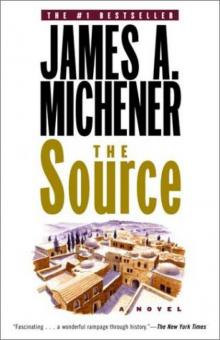 Source
Source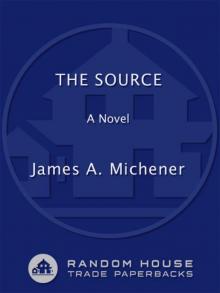 The Source: A Novel
The Source: A Novel Journey
Journey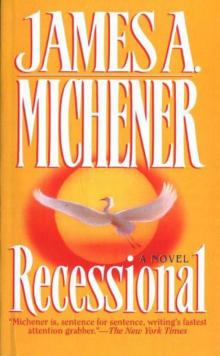 Recessional: A Novel
Recessional: A Novel Legacy: A Novel
Legacy: A Novel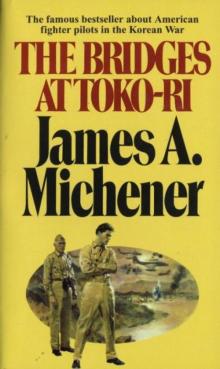 The Bridges at Toko-Ri: A Novel
The Bridges at Toko-Ri: A Novel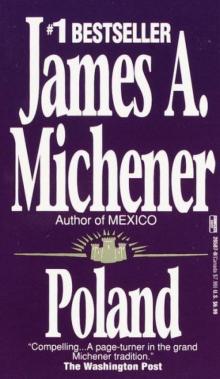 Poland: A Novel
Poland: A Novel